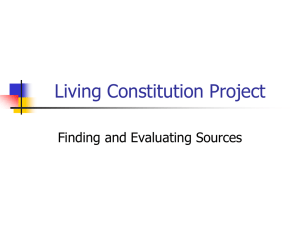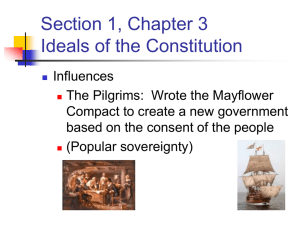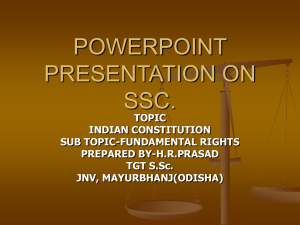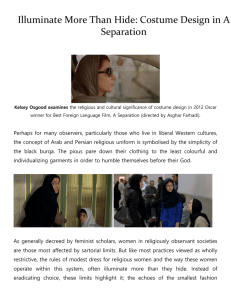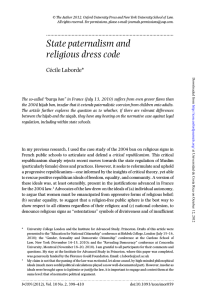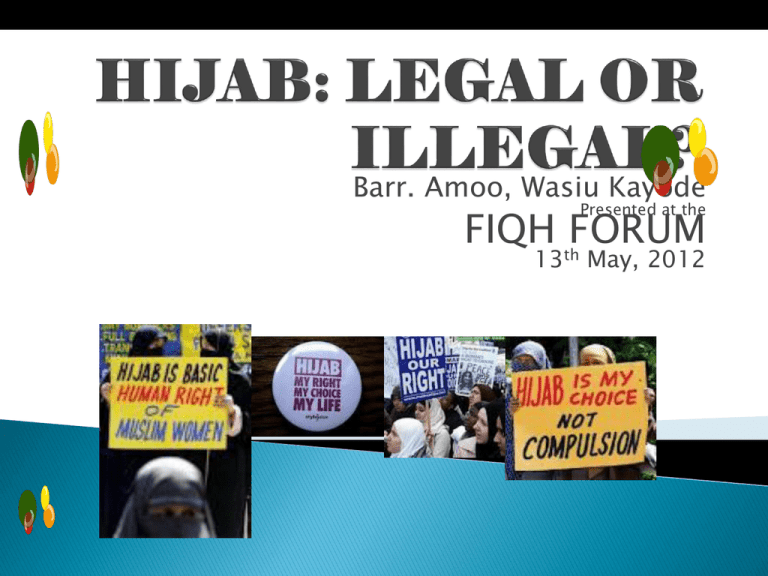
Barr. Amoo, Wasiu Kayode
Presented at the
FIQH FORUM
13th May, 2012
The
discourse on whether or not the
use of Hijab constitute fundamental
right of the Muslim Women will not
and can never be appreciated or
understood without an appraisal of
what Human Right is in the light of
constitutional provision.
L. Henkin once maintained that human rights
are claims asserted and recognised as of right
not claims upon love or grace or brotherhood
or charity.
In another breath, he sees human rights as
liberties, immunities and benefits which by
accepted contemporary values, all human
beings should be able to claim as of right of
the society in which they live.
Justice kayode Eso (J.s.c) in the case of
Olufunmilayo Ransome Kuti Vs A.G.F. says:
‘This is no doubt a right guaranteed to
everyone including the appellants by the
constitution, but what is the nature of a
fundamental right? It is a right which stands
above the ordinary laws of the land and which
in fact is antecedent to the political society
itself. It is a primary condition to a civilised
existence and what has been done by our
constitution since Independence’
Human Rights are the species of rights which
are immutable and inalienable that flow from
birth.
They are specially provided for to enhance
human dignity and its preservation. Human
rights and fundamental rights are used
interchangeably.
The latter is codified in the book form called the
Constitution, the Grundnum of the society and
thus best explained the inclusion of Human
Rights in the 1999 Constitution of the Federal
Republic of Nigeria under chapter 4.
Justice Oputa in his treaties on Human Rights
in the political and legal culture in Nigeria
says:
‘It is because each human being has
intrinsic worth that we talk of fundamental
rights or the inalienable rights of man and
in response to the question why are these
rights inalienable? He said ‘The simple
answer is that they attach to man because of
his humanity. Without them, there is
automatic diminution of his humanity’
In the case of Ransome Kuti Vs A.G.F (1985) 2
NWLR (pt 6)211 Kayode Eso (J.s.c), offered what
can be termed a classical definition of human rights
from the Nigerian Judiciary, he says :
‘It is a right which stands above the ordinary laws
of the land and which in fact is antecedent to the
political society itself. It is a primary condition to
a civilized existence and what has been done by
our (Nigerian) Constitution since independence is
to have these rights enshrined in the constitution
so that the rights could be immutable to the extent
of the non –immutability of the constitution itself’
These are rights inherent in man, which can
never be whittled down by any administrative
enactment or procedures. See Ariori Vs
Elemona (1983) 1 SCNLR 1Per Obaseki JSC
held that:
‘Fundamental rights entrenched in our
1963 and 1979 constitution are in my
opinion, out of reach of the operation of the
law of waiver. Our oath of office to protect
and defend the constitution over all other
laws ensures this…’
The use of Hijab by the Muslim Women falls within the
gamut of fundamental Human Right as universally
accepted under the Universal Declaration of Human
Rights adopted by the General Assembly of the
United Nations on December 10, 1948
Article 2 Guarantee freedom from discrimination,
Everyone is entitled to all the rights and freedoms set
forth in this Declaration, without distinction of any
kind, such as race, colour, sex, language, religion,
political or other option, national or social
origin,property,birth or other status
Article 18 specifically addressed Freedom of
thought, consicence and religion
That everyone has the right to freedom of
thought , conscience and religion
This right includes freedom to change his
religion or belief and freedom either alone or
in community with others and in public or
private, to manifest his religion or belief in
teaching, practice, worship and observance.
By the virtue of the Federal Republic of Nigeria
signatory to the Universal Declaration of the
United Nation Assembly, all declarations under
the Charter are domesticated in the members
Nation Constitution which include Nigeria.
This explains the provision of Fundamental
Human Rights in 1999 Constitution of the Federal
Republic Of Nigeria, the entire chapter 4
addressed Human Rights while Sections 38 and
42 specifically address right to religious practice
and freedom from discrimination.
Section 38 (1) Every person shall be entitled
to freedom of thought, conscience and
religion, including freedom to change his
religion or belief, and freedom (either alone
or in community with others, and in public
or in private) to manifest and propagate his
religion or belief in worship, teaching,
practice and observance.
That from Section 38(1) of the Constitution
the underlining words worthy of definition are;
manifest, observance and practice. From the
Longman’s Dictionary of Contemporary
English, New Edition at page 867,973 and
1104 as meaning to show or appear to
become easy to see’ ritual observances and
something that you do often because of your
religion or religious beliefs and practices
respectively.
Section 42 (1) A citizen of Nigeria of a
particular community, ethnic group, place of
origin, sex, religion or political opinion shall
not, by reason only that he is such a person
a. be subjected either expressly by, or in the
practical application of ,any law in force in
Nigeria or any executive or administrative
action of the government, to disabilities or
restrictions to which citizens of Nigeria of
other communities, ethnic groups, places of
origin, sex, religions or political opinions are
not made subject; or
b. be accorded either expressly by, or in the
practical application of, any law in force in
Nigeria or any such executive or
administrative action, any privilege or
advantage that is not accorded to citizens of
Nigeria of other communities, ethnic
groups, places of origin, sex, religions or
political opinions.
In the case of Fatimo Abidemi Rasak & 3
Ords Vs Commissioner for Health Lagos
State & 3 Ords Suit No ID/424M/2004
delivered in 2004 by Hon Justice J.O.K
OYEWOLE of the Ikeja High Court Lagos
State in favour of the students allowing the use
of Hijab on School uniform, as fundamental
right, the lawsuit gave a better appreciation of
Sections 38 and 42 of the 1999 Constitution
wherein the Judge said and I quote:
‘the courts will give especially broad, liberal
construction to those constitutional provisions
designed to safeguard fundamental rights’. I
think this approach should normally be at the
background so as to be able to accommodate
the social changes, which advancements and
the passage of time have brought in their trail.
This does not mean changing the words used
by the framers of the constitution, but coming
to terms with changing times even upon a
literal interpretation of clear unambiguous
words’
... And more importantly, the applicants are
not as can be seen in Exhibits 3 and 4,refusing
to wear the prescribed school uniforms but are
simply seeking not to leave their heads
uncovered in accordance with the dictates of
their faith’.
Another opportunity presented itself at the Court of
Appeal Ilorin,Kwara State in the case of The
Provost Kwara State College Of Education,
Ilorin & 2 Ords Vs Bashirat Saliu &2 Ords Suit
No CA/IL/49/2006 the Court of Appeal Coram Hon
Justice Hussein Mukhtar (JCA) with two other
eminent Justices went further to give a broader
appreciation of Sections 38 of the 1999 Constitution
‘that the Muslim Women Right is not limited to
the use of Hijab alone, it equally extend to the
use of Veil/Niqab even in public places without
any molestation’,
the court held that
‘…the veiled dress is recommended for Muslim
Women, which the respondents undeniably are,
and which also enhances the preservation of their
honour and chastity. It is their fundamental right
to practice and observe their religious injunctions
in any part of Nigeria …’
In the same Court of Appeal decision herein
referred, Hon Justice M. A. Oredola (JCA) in
his own submission says and I quote
‘the right of the respondents to wear their
Hijab, Veil within the school campus and
indeed anywhere else is adequately protected
under our laws. Human Right recognizes and
protects religious rights, Section 38 of the
1999 Constitution of the Federal Republic of
Nigeria guaranteed freedom of religion to all
and sundry…
Thus, things that lawfully constitute open
manifestation, propagation, worship, teaching,
practice and observance of the said religion are
equally and by extension similarly guaranteed
and protected by the constitution,
Indeed, the Hijab, Niqab or burqa, being part
and parcel of Islamic mode of dressing and by
whatever standards a dignified or vividly
decent one, cannot be taken away by any other
law other than the Constitution…’
The Right of Muslim Women to use Hijab is
recognised as Fundamental Human Right even in the
UK,U.S.A, Muslim women who are Security officers
are given the option to wear the Hijab on duty so also
its acceptance in Government owned Schools and
Institutions, same position held applicable in other
Jurisdictions that are signatory to the United Nations
Charter, why the problem in Nigeria?.
Nigeria problem is borne out of religious bigotry and
sentiment, which has no basis in law.
Nigeria law is clear and unambiguous on
constitutional guaranteed rights and such rights
cannot be negotiated or compromised.
From the foregoing it is evidently established that the
Nigerian judiciary has indeed clarified and laid to rest the
controversy on whether or not the Muslim Women can use
Hijab, Veil, Niqab or burqa in public places
and
institutions including public schools.
Hijab indeed is a fundamental Human Right of the Muslim
Women, the task of acceptability now lie with the
Government and the public administrators who have always
been at the vanguard of not allowing harmony in the
community but have chosen an environment of stifling
regimentation, reminiscent of fascist dictatorships with lazy
and unreasonable arguments that the acceptance of Hijab
will trigger crisis in public places, even in the face of
Judicial interpretations.
I refused to be cajoled into any argument that will subvert
the fundamental rights of the Nigerian Citizens, affront to
the Judicial Interpretation and violation of the
Constitutional provisions.
In the word of Per Karibi-Whyte.JSC in the case of A.G
ONDO STATE VS A.G EKITI STATE (2001) 17 NWLR
(Pt 743) 706@ 773 held that
‘Parties cannot contract out their constitutional rights.
That is clearly not permissible, and in my opinion not
the subject matter for argument between the parties’
Without mincing word, the next line of action is for us all,
to turn to Human Rights crusaders with the view of urging
our Government and its agencies to come to terms with the
Constitutional provisions and acceptance of Judicial
pronouncements from time to time and never to be tired to
institute court action where necessary to safeguard the
sanctity of our constitution.
Hijab:
Thanks
my right, my honour
and my pride.
for your rapt attention




